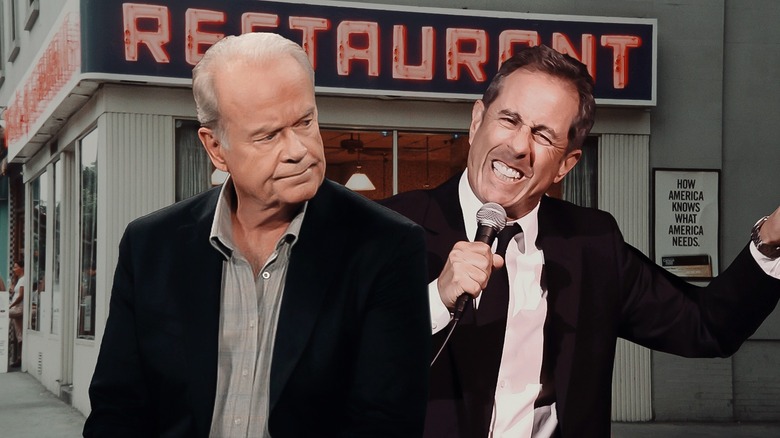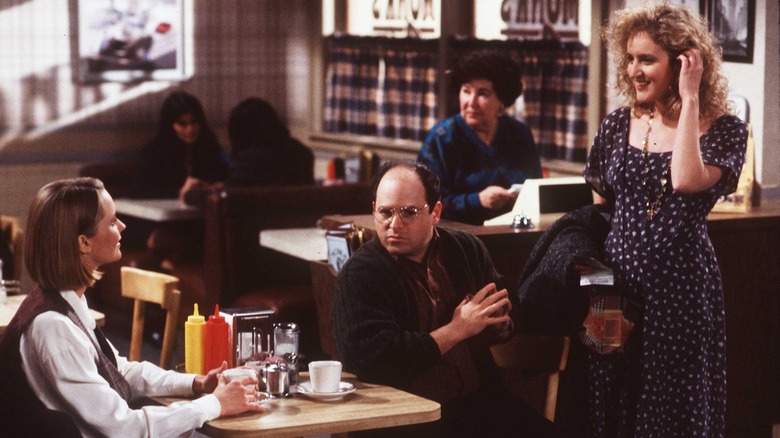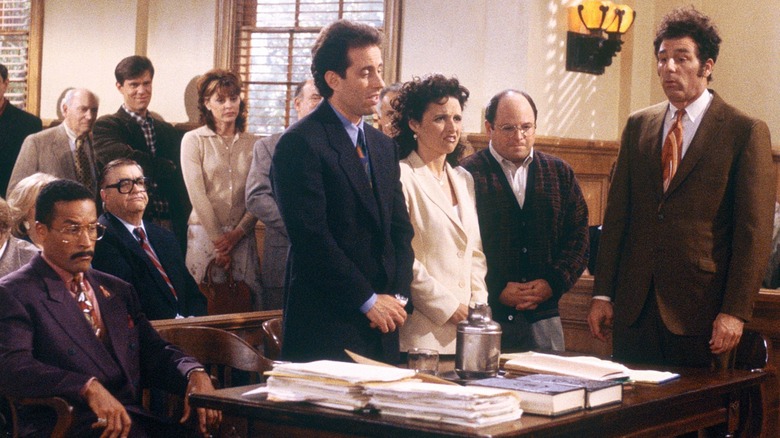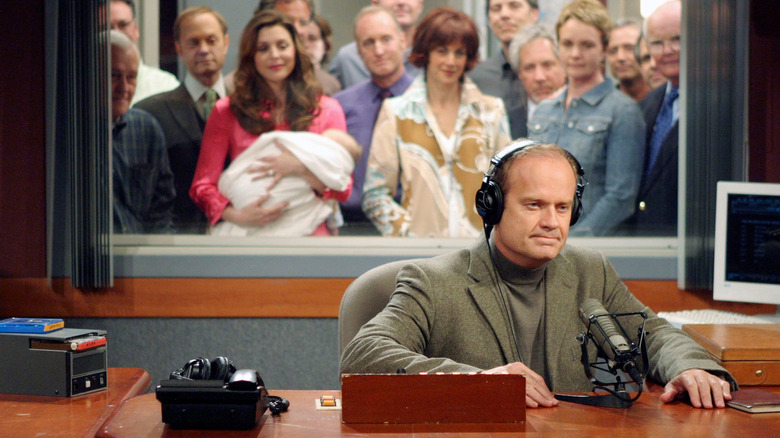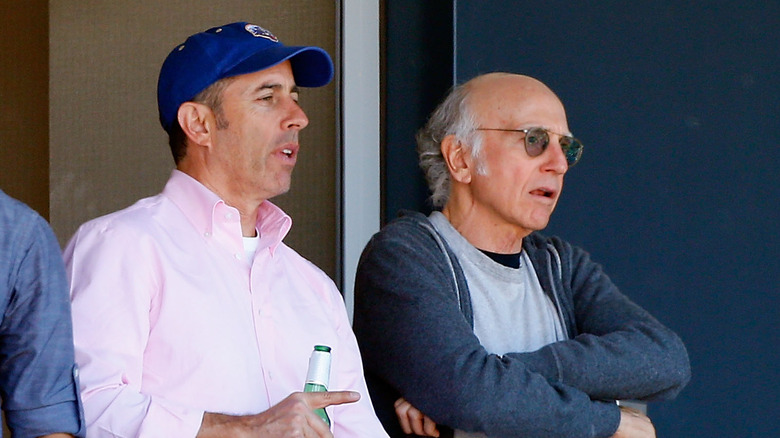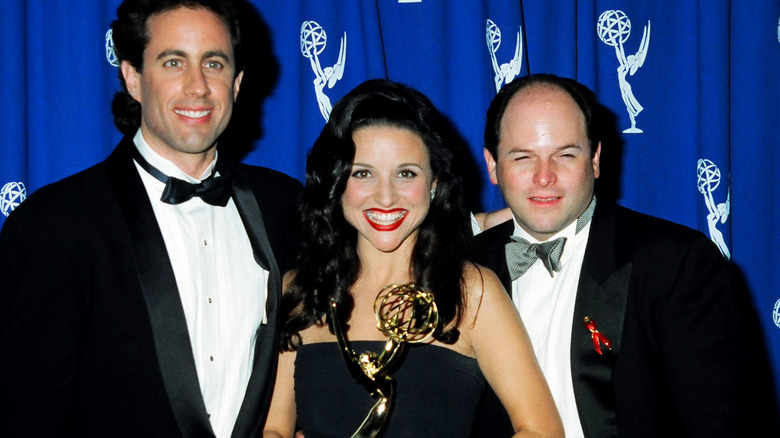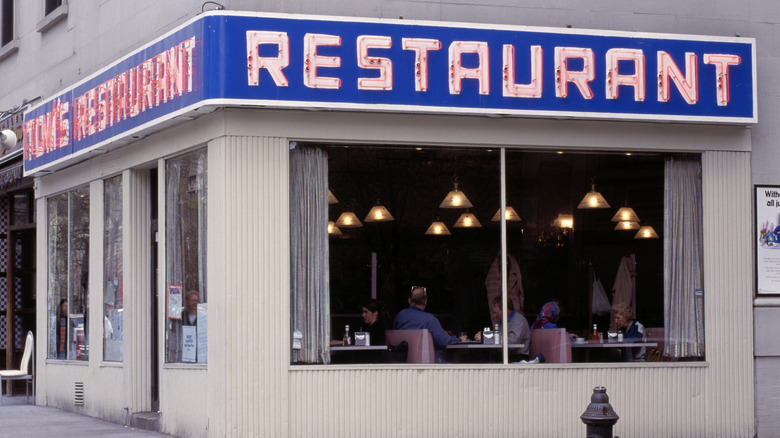Frasier's Reboot Proves The Seinfeld Reunion Will Be Depressing & Pointless
There's a reason everybody says you can't go home again.
No bones about it, trying to restart a cultural juggernaut years after its prime is hard — and it's even harder when it's a sitcom. That's why the cast and creators of "Friends" have avoided returning to their characters, despite endless pleas to do so: the jokes that tickled everybody's funny bones in the 1990s don't always age well, and the sheer concept of a revival usually means undoing happy endings. This, in turn, risks not only the integrity of the new program, but can also chip away at the original program's legacy.
Undone endings — happy or not — haunt the latest wave of reboot discussions. The rebooted version of "Frasier" has thus far yielded mixed results, as it picks apart the happy ending the titular character (Kelsey Grammer) earned in his original series to plunge him into the uncertainties of academia and old age, making all of his previous struggles feel pointless. His struggles with his various life failures are, honestly, rather depressing. How you feel about that focus largely determines whether you're going to like the reboot or not.
Enter "Seinfeld." The proposition of a reunion has floated around for years, but in 2023, Jerry Seinfeld amped up "Seinfeld" rumors by revealing that he and Larry David had actively discussed it. On one hand, the appeal of a "Seinfeld" reunion has always been the notion of getting to fix the much-hated series finale, but in light of the "Frasier" reboot, it's worth asking whether finally getting the old New York gang back together might leave fans sorry they asked for it.
The stakes are too high, and a Seinfeld revival -- like Frasier -- won't please everybody
Whenever a beloved TV property gets revived, expectations are sky-high. "Seinfeld," though, was so massive that there's almost no way a revival can be anything but a disappointment.
As far as the legacy the new "Frasier" leaves, the jury is still out. There's definitely enthusiasm for the show from many viewers, but critical reactions haven't been wholeheartedly supportive: it sits at a 58% approval rating at Rotten Tomatoes. Compared to the extremely high level of acclaim the original version of "Frasier" received, it's quite a comedown. Of course that score could change as the series goes on, but if audiences aren't interested in watching it, then they won't show up in the first place.
Is it worth risking the absolutely stellar legacy of "Seinfeld" with a reboot? Imagine the backlash if it's terrible. Is it better to leave the show's characters forever locked in that rural jail cell? Well, there are certainly issues with that, too, but if the revival were a letdown it would only further muddy the waters, forever ending the show's story on a down note. The stakes are so astronomically high when it comes to the high quality of "Seinfeld" that it might not be worth trying to recapture the magic. And the negativity with which people view the finale, in fact, lends further credence to the argument to let "Seinfeld" lay in its grave.
Bringing Seinfeld back will repeat the mistakes of the hated finale
Again, audiences have long wanted to revisit the world of "Seinfeld," if only undo a series finale that hasn't aged very well and was unpopular even when it aired. As we all remember, the show ended with George (Jason Alexander), Jerry (Jerry Seinfeld), Elaine (Julia Louis-Dreyfus) and Kramer (Michael Richards) being sent off to prison for violating a small Massachusetts town's Good Samaritan law. Their cruel mockery of a carjacking victim results in a jail sentence for everyone. It's a downer ending that focuses on the flaws of the characters, and asks viewers why they ever bothered empathizing with such a self-absorbed crew in the first place. It's a series finale that even Jerry Seinfeld himself has come to regret.
Here's the thing about bringing back "Seinfeld." The creators intended that finale.
The point of the show was never to connect to these narcissistic characters on an emotional level, as we do with shows like "Friends" or "Scrubs" — that's why nobody on "Seinfeld" ever hugs, and why the death of Susan (Heidi Swedberg) is treated so mockingly. A revival will continue this trend. The nature of a sitcom means that, as with the "Frasier" revival, none of these characters can have experienced a happy ending. Even if they get out of prison, the entire purpose of the show — by its nature — will be to poke and prod and laugh at the misfortunes of these characters struggling with whatever vapid obsessions they have in their old age. Sure, seeing them get imprisoned was depressing. Will it be any happier seeing them as bitter divorcees, or struggling with health issues they can't fix?
Do we really want characters like the Seinfeld crew or Frasier to grow up?
Even if a "Seinfeld" revival gives us a reprieve from the downer finale, it also means committing to a solid future for every character. Even if the characters aren't miserable in the 21st century, they'll simply be boring: do we really care to watch a show wherein this gang of self-absorbed folks actually grew up and got their acts together? Do we want to watch Elaine struggle with parenting an adult daughter? Is it any better if she stayed childfree and is now trying to navigate the singles landscape in her 60s, as an ex-con? Jerry's struggles as a comedian in the present-day would admittedly be very funny — a Tik Tok episode practically writes itself — but seeing him still living in that same apartment will feel weird. Can Kramer still be Kramer if he's a senior citizen? And George ... well, nobody expects a happy ending with George.
Physical comedy with this cast won't work the same way — just look at the sad case of "Life with Lucy." Asking a set of characters to shift with the times — or, like Lucy, simply ignore them — forces us to grapple with our own mortality in a way that is very not in tune with what "Seinfeld" ever was. "Frasier," as a dramedy, demonstrates this. The original show ended with him forgoing a career opportunity to pursue love with Charlotte (Laura Linney), but the reboot has consciously undone that ending by killing their relationship and making him a syndicated talk show dilettante. Depressing? Yes. The right choice? Up to the viewer, but life does take sad turns like that, and it is in keeping with the tone that "Frasier" always set. Sadness is not something we want to associate with "Seinfeld."
A Seinfeld revival will chip away at the original show's place in pop culture
And then there's one simple fact: sometimes, shows ought not to be brought back to life because their sense of humor is strongly wedded to the time period in which they aired. The sensibility of "Seinfeld" is very intertwined with the 1990s; after all, there's a whole plotline that revolves around the long-defunct restaurant chain Kenny Rogers Roasters. VCRs and answering machine jokes provided additional laughs. There are also jokes and plotlines — whether they're about Elaine clashing with a so-called "bubble boy" or phrases like "man hands" — which haven't exactly aged the best.
In that respect, it's easier to adapt "Frasier" to the modern era, as it isn't as strongly connected to the 1990s and 2000s as "Seinfeld" was. The meanness of "Seinfeld" is exactly what makes it so funny, but bringing it back requires reexamining certain jokes that are better left in their era. If the show tries to course-correct this by being too "nice," meanwhile, it just would cease to be "Seinfeld." Either way, it will change the relationship viewers have with the original show, and if things go wrong, make them feel more distant from it.
The Seinfeld cast is better off without dredging up the past
The most important factor standing between a "Seinfeld" reunion is the fact that almost every single member of the show's main cast and creative crew have managed to forge healthy, successful careers without the series. Jerry Seinfeld has gone back to stand-up comedy, to rousing success, when he's not hosting YouTube shows about comedians (or U.S. presidents!) taking car rides and getting coffee together. Julia Louis-Dreyfus became the first actor from the series to have a major breakthrough success, first with the long-lived sitcom "The New Adventures of Old Christine," then with the critically acclaimed comedy "Veep." Jason Alexander has forged a successful career as a voiceover artist. And Larry David has stepped in front of the camera to helm the popular HBO comedy "Curb your Enthusiasm," which recently saw its own revival.
Almost every single actor and important behind-the-scenes personality attached to the sitcom has stayed busy after the "Seinfeld" finale, and there seems to be little reason for them to return to their roles. The exception, of course, is Michael Richards, whose life after "Seinfeld" is its own problematic can of worms. That itself poses another important question: would NBC risk hiring Richards again and be forced to dodge the backlash of doing so? Because "Seinfeld" wouldn't work without Kramer. Again, it's a no-win scenario.
Furthermore, all of these actors (Richards aside) have nothing to gain, and a lot to lose, by dipping back into the "Seinfeld" well.
There is one way to do a Seinfeld reunion without hurting the show's legacy
But with all of those negatives in mind, one is left to wonder — is there a way to bring "Seinfeld" back that's not depressing or tough to watch?
It's not easy, but it's possible. The key is to not stick to the continuity of the original show, or medium, or try to replicate it. For example, a revival could conceivably work if it were animated – which is the way "Married...with Children" is planning on reuniting its maladjusted suburbanites — because it could just tell "Seinfeld"-like stories, with the eternally young characters from the original show, while poking at contemporary oddities like the old show did with 1990s ones. If they keep the cast out of sight, that's also a fairly neat way to get around the whole Kramer-recasting problem, should they want to avoid any controversy, and it also avoids audiences having to grapple with their own aging by seeing how much older the original cast is.
That's not to say a live-action "Seinfeld" reunion can't work. This is a very, very talented crew, after all. But it's a near-impossible challenge to rise to, and it's important to understand the risks. Above all, full commitment would be needed from every cast member, because on a show like "Seinfeld," nailing the jokes is everything — and might be the only thing that saves this beloved property from a bad reboot.
